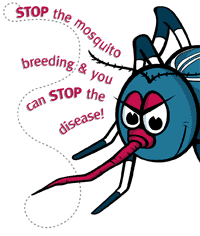Local chikungunya cases jump to ten
 (CNS): Over the last week results of blood tests from four people have confirmed that they acquired chikungunya in the Cayman Islands last month, bringing the number of patients catching the virus locally to ten. Two of these patients live in Bodden Town and two live in George Town and none of them have a recent travel history to affected countries in the region. But with the disease now taking hold in Jamaica and with 18 people, more than half of Cayman’s 34 confirmed cases of chikungunya virus being acquired there, public officials are expecting more local transmissions.
(CNS): Over the last week results of blood tests from four people have confirmed that they acquired chikungunya in the Cayman Islands last month, bringing the number of patients catching the virus locally to ten. Two of these patients live in Bodden Town and two live in George Town and none of them have a recent travel history to affected countries in the region. But with the disease now taking hold in Jamaica and with 18 people, more than half of Cayman’s 34 confirmed cases of chikungunya virus being acquired there, public officials are expecting more local transmissions.
“The Public Health Department in collaboration with other agencies such as MRCU, continue surveillance efforts for the identification of locally acquired cases,” Dr Kiran Kumar, the medical officer of health stated in the wake of the most recent results.
“With about six positive cases of local transmission in October along with nine suspected cases in the previous week suggest that unless the public protect themselves from mosquito bites and take measures against mosquito breeding especially after the recent rains, we can have more cases,” he added.
Confirmed cases have occurred on all three islands and in residents in every district so far except East End. One person so far picked up the mosquito transmitted disease in St Lucia, two in the Dominican Republic, three in Guyana, 18 in Jamaica and now ten people here in Cayman, as a result of being bitten by mosquitos which had previously bitten other infected people.
During the past week, 21 results from suspected cases were received and just the four local transmissions were confirmed the rest were negative for chikungunya.
There were another 16 suspected cases of Chikungunya reported to the health authorities during the week 4-10 November based on symptoms and seven had travelled to Jamaica, but nine reported no travel history. The hospital is now waiting on results from a total of 19 blood samples which were sent to the Caribbean Public Health Agency (CARPHA) in Trinidad over the last few weeks.
Chikungunya causes fever, severe joint pain, muscle pain, headache, nausea, fatigue and rash. Officials urge anyone who may be experiencing these symptoms to immediately see a healthcare provider. They also remind the public to use mosquito repellent with DEET on the skin, and wear long sleeve pants and shirts when outside during times that mosquitoes bite, whether in the Cayman Islands or on travels.
As at 7 November 6,280 cases of Chikungunya had been reported from 24 Caribbean countries.
Further information can be obtained through www.hsa.ky. Regional updates can be accessed by visiting the CARPHA website on http://carpha.org/What-We-Do/Public-Health-Activities/Chikungunya. In addition United States updates are available from the Centers for Disease Control and Prevention on http://www.cdc.gov/chikungunya/geo/united-states.html.
Category: Health


keep in mind that 99% of cases are imported and very few local cases,M.R.C.U is in control and working hard
…with a much-reduced budget this year.
Meanwhile, HSA magically receives $800k to build an Ebola isolation and treatment tent for a virus, which under current revised travel restrictions, has a very slim chance of projectng beyond three small countries in West Africa – foresaking reason, and all other known viruses to mankind including direct and present threats to the population of the Cayman Islands.
100% of the Chikungunya virus was imported, but clearly, it is now establishing itself for local transmission and spreading to people with no travel history – albeit few cases. We should be at war – fogging the heck out of these neighbourhoods to stop this advancement. We would hope that HSA should be leading the call for coordinated inter-governmental action in that regard.
In all the areas of governmental waste, the MRCU budget should not be the one to be cut.
The virus is carried by mosquitoesthat are found indoors, not outside.
Can one die from Chikungunya?
People have, but it's not usually fatal.
I dont know – but you're welcome to give it try…
Death is very rare.
Rare from Chickenchimichanga, however eventually inevitable in general.
Not usually. The big impact is the prolonged period of severe joint pain and disability, in some cases lasting decades after the initial fever is a memory. Some victims never work again. The lingering debilitation could be a fate worse than death for family breadwinners dependent on mobility, or anyone that aspires to walk around pain-free (100% of victims).